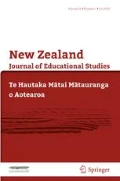Abstract
In this paper we outline a case for including realism as an approach for carrying out research in education. Realism is often missing or under-represented in methodology text books which tend to misrepresent positivism and over-claim the epistemic authority possible for interpretivism. While interpretivism is arguably the dominant research approach in education, we argue it has limitations in regards to producing knowledge generalisable beyond specific research contexts. We suggest that realism has much to offer researchers and advocate for greater recognition of its usefulness in social science research. To this end, we describe the realist approach employed by one of the authors in her research to provide an example of how abstract ideas may look in practice.
Similar content being viewed by others
Notes
At the time she termed this a ‘methodological device’.
References
Bernstein, B. (2000). Pedagogy, symbolic control and identity: Theory, research, critique. (Rev. ed.). New York: Rowman & Littlefield.
Bhaskar, R. (1998). Facts and values: Theory and practice/reason and the dialectic of human emancipation/depth, rationality and change. In M. Archer, R. Bhaskar, A. Collier, T. Lawson, & A. Lorrie (Eds.), Critical realism: Essential readings (pp. 409–443). Abingdon: Routledge.
Carr, W., & Kemmis, S. (1995). Becoming critical: Education, knowledge, and action research. London: Hyperion Books.
Carter, B., & New, C. (2004). Social theory and empirical research. In B. Carter & C. New (Eds.), Making realism work: Realist social theory and empirical research (pp. 1–20). Abingdon: Routledge.
Chakravartty, A. (2011). Scientific Realism (Fall, 2015 edn). In: Edward, N. Z. (Ed.), The Stanford encyclopedia of philosophy. Retrieved from http://plato.stanford.edu/archives/fall2015/entries/scientific-realism/.
Cohen, L., Manion, L., & Morrison, K. (2011). Research methods in education. Abingdon: Routledge.
Collins, H. (2010). Creative research: The theory and practice of research for the creative industries. Lausanne: AWA Publishing.
Danermark, B., Ekstrom, M., Jakobsen, L., & Karlsson, J. (2009). Explaining society: Critical realism in the social sciences. London: Routledge.
Fox, N. J. (2008). Post-positivism. In L. M. Given (Ed.), The SAGE encyclopedia of qualitative research methods. London: Sage.
Gramsci, A. (1971). Selections from the prison notebooks of Antonio Gramsci. New York: International Publishers.
Layder, D. (1985). Beyond empiricism? The promise of realism. Philosophy of the Social Sciences, 15(3), 255–274.
Little, D. (2011). Causation in the social realm. In P. McKay Illari, F. Russo & J. Williamson (Eds.), Causality in the Sciences. Oxford Scholarship on line.
Lourie, M. (2014). Symbolic policy: A study of biculturalism and Māori language education in New Zealand (Doctoral Thesis, University of Auckland, Auckland, New Zealand).
Lourie, M., & Rata, E. (2016). Using a realist research methodology in policy analysis. Educational Philosophy and Theory. doi:10.1080/00131857.2016.1167655.
Manicas, P. (2006). A realist philosophy of social science: Explanation and understanding. New York: Cambridge University Press.
Maton, K., & Chen, R. T. H. (2016). LCT and qualitative research: Creating a language of description to study constructivist pedagogy. In K. Maton, S. Hood, & S. Shay (Eds.), Knowledge-building: Educational studies in legitimation code theory (pp. 27–48). Abingdon: Routledge.
Merriam, S. B. (1998). Qualitative research and case study applications in education. San Francisco: Jossey-Bass.
Merriam, S. B., & Tisdell, E. J. (2015). Qualitative research: A guide to design and implementation. San Francisco: Wiley.
Moore, R. (2007a). Going critical: The problem of problematizing knowledge in education studies. Critical Studies in Education, 48(1), 25–41.
Moore, R. (2007b). Sociology of knowledge and education. London: Continuum.
Moore, R. (2009). Towards the sociology of truth. London: Continuum.
Moore, R. (2013). Social Realism and the problem of the problem of knowledge in the sociology of education. British Journal of Sociology of Education, 34(3), 333–353.
Mutch, C. (2013). Dong educational research: A practitioner’s guide to getting started. Wellington: NZCER Press.
Neuman, W. L. (1994). Social research methods: Qualitative and quantitative approaches. Boston: Allyn and Bacon.
Nola, R. (2001). Review of Michael Matthews’ time for science education. Educational Philosophy and Theory, 33, 427–430.
Popper, K. (1978, April 7). The Tanner lecture on human values, three worlds, presented at The University of Michigan. Retrieved from http://tannerlectures.utah.edu/_documents/a-to-z/p/popper80.pdf
Pountney, R., & McPhail, G. (in-press). Researching the interdisciplinary curriculum: The need for ‘translation devices’. British Educational Research Journal. doi:10.1002/berj.3299.
Rata, E. (1996). ‘Goodness and power’: The sociology of liberal guilt. New Zealand Sociology, 11, 231–274.
Rata, E. (2008). Educating for citizenship in a bicultural society. In S. Brown, J. O’Neill, & A. St George (Eds.), Facing the big questions in teaching: Purpose, power and learning (pp. 51–61). Melbourne: Cengage.
Rata, E. (2010). A sociology ‘of’ or a sociology ‘for’ education? The New Zealand experience of the dilemma. International Studies in Sociology of Education, 20(2), 109–128. doi:10.1080/09620214.2010.503060.
Rata, E. (2012). The politics of knowledge in education. London: Routledge.
Rose, N. (1999). Powers of freedom. Cambridge: Cambridge University Press.
Rata, E. (in-press). Connecting knowledge to democracy. In B. Barrett, U. Hoadley & J. Morgan (Eds.), Knowledge, curriculum and equity: Social realist perspectives. London: Routledge.
Sayer, A. (2000). Realism and social science. London: Sage.
Schwandt, T. A. (2007). The Sage dictionary of qualitative inquiry. Thousand Oaks: Sage Publications.
Shipway, B. (2011). A critical realist perspective of education. New York: Routledge.
Shore, C., & Wright, S. (2011). Introduction. Conceptualising policy: Technologies of governance and the politics of visibility. In C. Shore, S. Wright, & D. Pero (Eds.), Policy worlds: Anthropology and the analysis of contemporary power (pp. 1–25). New York: Berghahn Books.
Young, M. F. D. (2008). Bringing knowledge back in: From social constructivism to social realism in the sociology of education. London: Routledge.
Young, M., & Muller, J. (2010). Three educational scenarios for the future: Lessons from the sociology of knowledge. European Journal of Education, 45(1), 11–27.
Author information
Authors and Affiliations
Corresponding author
Rights and permissions
About this article
Cite this article
McPhail, G., Lourie, M. Getting Real: Is Realism a Blind Spot in Research Methodology?. NZ J Educ Stud 52, 285–299 (2017). https://doi.org/10.1007/s40841-017-0087-y
Received:
Accepted:
Published:
Issue Date:
DOI: https://doi.org/10.1007/s40841-017-0087-y




